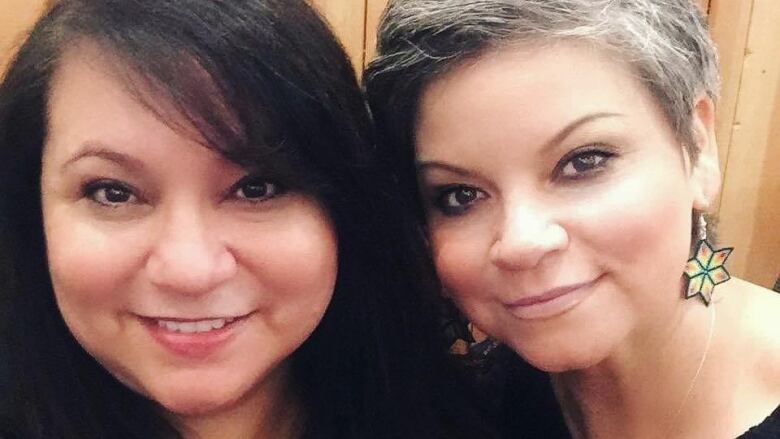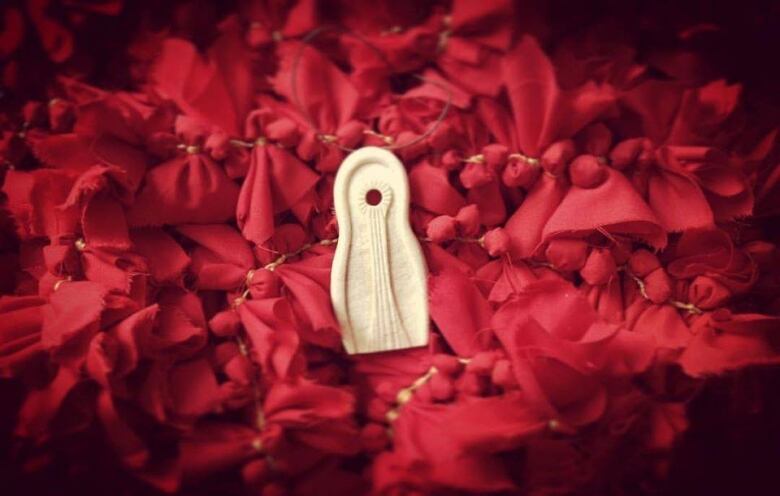Winnipeg woman makes 1,200 tobacco ties each spring for MMIWG
Gerri McPherson makes tobacco ties to honour her sister and her aunt

Since 2017, Gerri McPherson of Winnipeg has made 1,200 tobacco ties each spring to honour her sister, her aunt and other missing and murdered Indigenous women and girls in Canada.
McPherson says each tobacco tierepresents a woman who has gone missing or has been murdered.
In the U.S., May 5is the National Day of Awareness for Missing and Murdered Indigenous Women and Girls, and the day is also observed in many places in Canada.
Tobacco ties are pieces of cloth that have tobacco inside of them. Tobacco ties are used as spiritual offerings among some Indigenous nations in North America.
McPherson, who is Anishinaabe from Peguis First Nation, madethe first set of 1,200 ties in 2017using red cloth, sinew and tobaccoand took them to be hung up in the lodge where sundances are held.
The sundance is one of the most important ceremonies for many Indigenous nations in North America. It is held outdoors and usually takes place in the early days of summer. Itinvolves personal sacrifices like giving up food and water during that time.
"When I sundance with them, I'm dancing for healing for my family and the other families that are affected. I pray for justice for the families that have women [who have been] murdered," said McPherson.
"When we put them around the tree, it looked like a bouquet of roses, it looked so beautiful."
McPherson makes the tobacco ties to honour her aunt Jennifer Johnston, who was killed in 1980, and her sister Jennifer McPherson who was killed in 2013.
According to her sister Kim McPherson, Jennifer was reported missing on April 29,2013, and the police later confirmed her death with the family on May 5, 2013.
"That's why May 5has extra meaning to us, too," said Kim McPherson.

Gerri McPherson said the work making the tobacco tiesis time consuming and sometimes leaves her hands with blisters. To help finish the tobacco ties every year, McPherson receives monetary donations from her sundance community for cloth and tobacco, and some people offer to help make them.
Since 2017, Kim McPherson has helped her sister to prepare the 1,200 tobacco ties but hasn't been able to this year due to COVID-19 restrictions.
"It's a lot of work to do that," said Kim.
"The fact that other people help her, whether it's through donating materials or helping to pay for the cloth, sinew, tobacco, I think it's amazing and it helps other people to heal."
According to Gerri McPherson, the sundance that she attends is postponed, so she will continue to make the tobacco ties and will decide what to do with them later this summer.
'Not alone'
Atlohsa Family Healing Services,an Indigenous-led healing and wellness service provider in London, Ont.,organized a virtual memorial event on May 5 and put a call-out on Facebook for people to share photos of themselves using the hashtag #SeeMe.
"During the COVID-19 pandemic, violence against women is a concern as many women and children are vulnerable and isolated at home with their abusers," said Alana Lees, director of development with Atlohsa.
"For us, it was so amazing to see all of the people who came together to share their photos in solidarity.I hope that other people feelin their journeysthat they are not alone, that there is a whole community out there."
Lees said Atlohsa operates a program called Zhaawanong, a 24-hour safe space for woman and children at risk of homelessness and domestic violence.
She acknowledged that it may be tougher for people to get help at the moment, but said that places like Zhaawanong remain open.












_(720p).jpg)


 OFFICIAL HD MUSIC VIDEO.jpg)
.jpg)



























































































